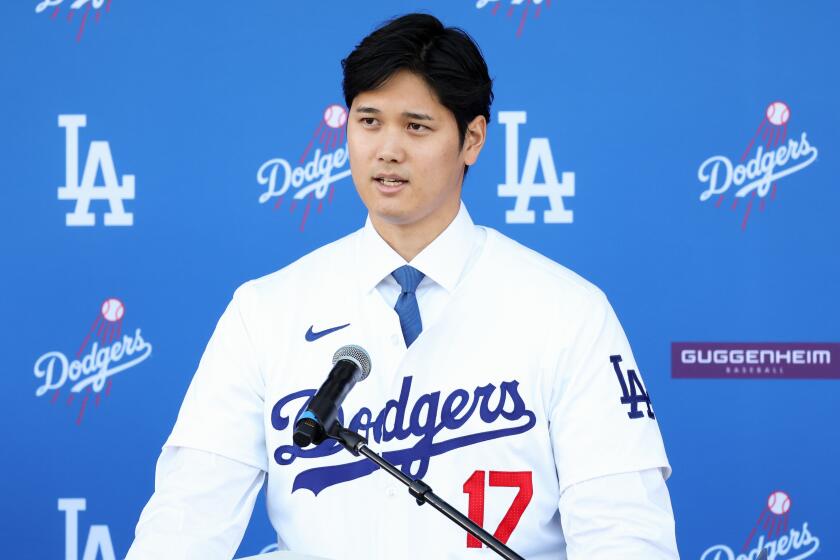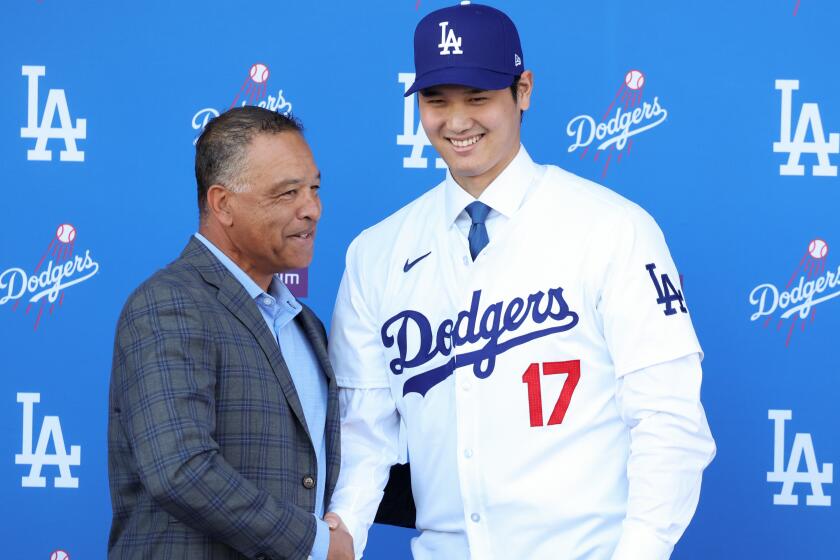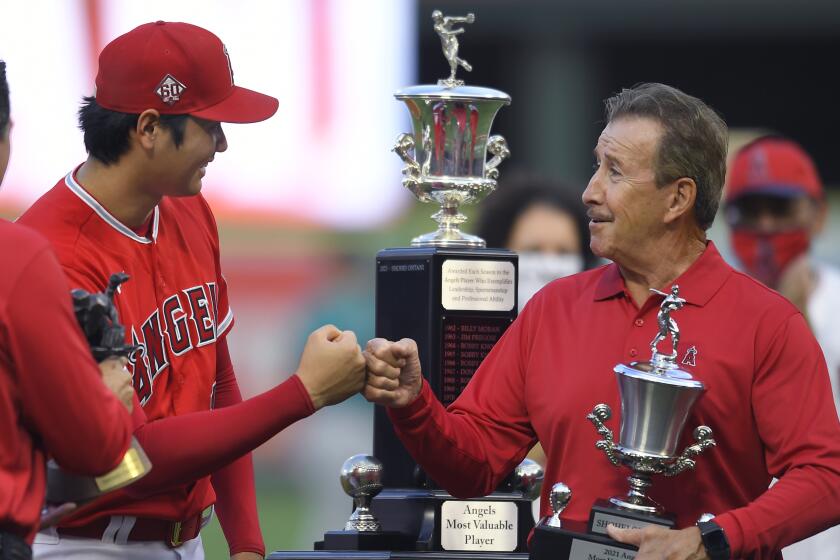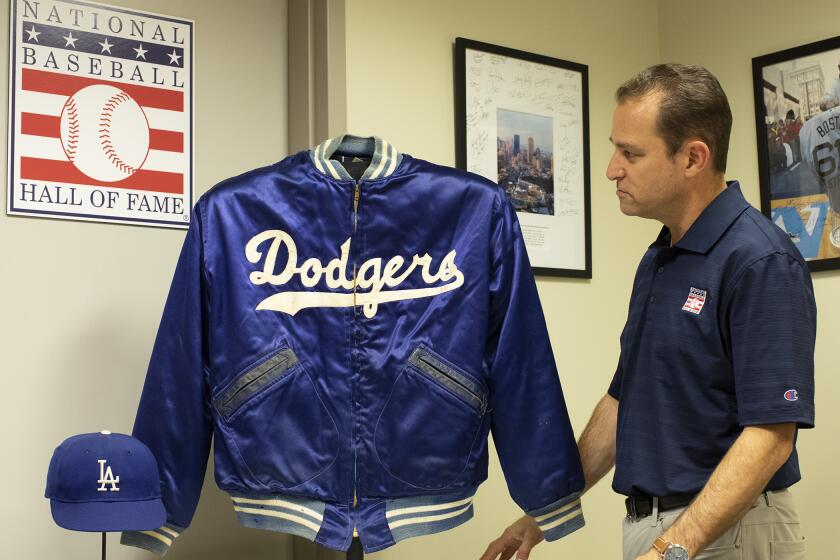Column: Are the Dodgers ready for the reality of having Shohei Ohtani on the team?
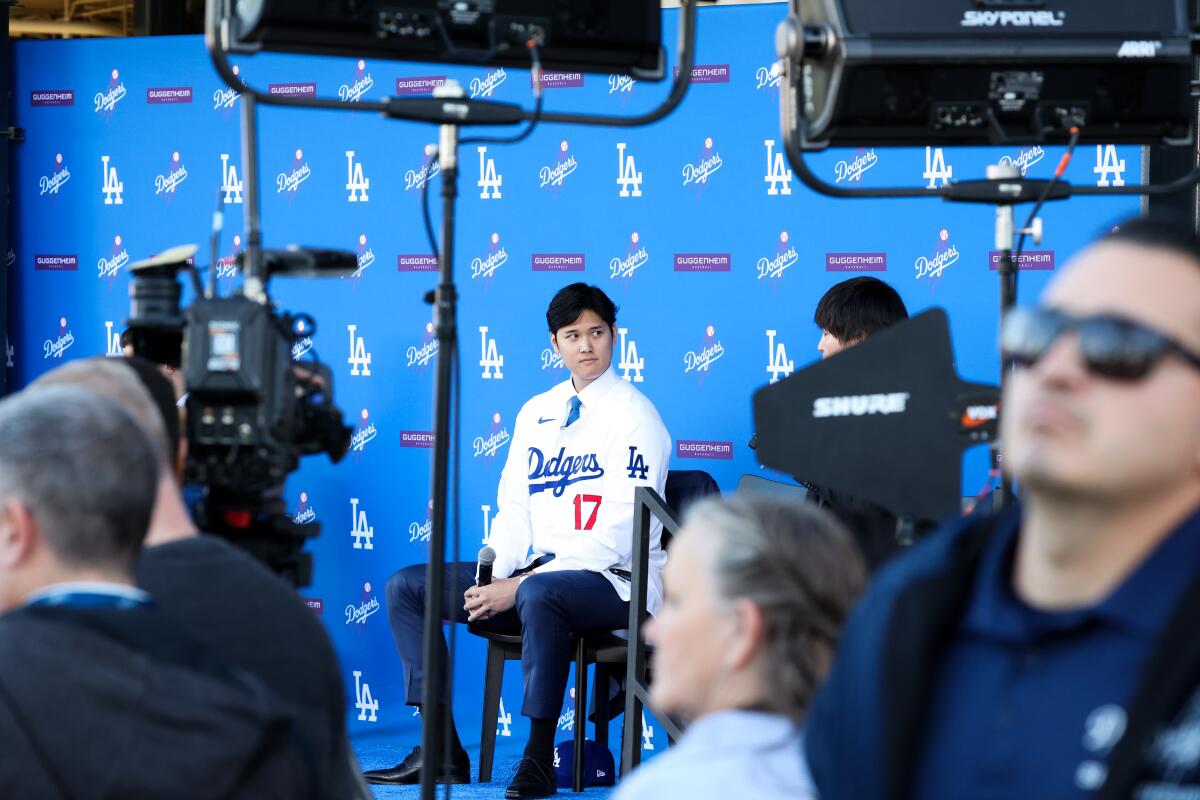
- Share via
When LeBron James spoke publicly for the first time as a Laker, he attracted a crowd that looked as if it was half the size of this.
Shohei Ohtani’s introductory news conference on Thursday was unprecedented in scale, with more than 300 journalists packed shoulder to shoulder in Dodger Stadium’s center-field plaza.
There are instances that fundamentally transform a franchise, and this was one of them.
Similar to how the Dodgers were redefined by the emergence of Fernando Valenzuela and similar to how they established a new identity by trading for Adrian Gonzalez, they entered a new era when they officially signed the 29-year-old Ohtani this week.
Are the Dodgers ready?
Shohei Ohtani, baseball’s top free agent, agrees to a $700-million deal with the Dodgers. Here’s everything you need to know about Ohtani joining the Dodgers.
The line for reporters to enter the stadium stretched almost 100 yards. The news conference started at 3 p.m. — or 8 a.m. the next day in Japan. This wasn’t a coincidence, as the event was carried live by five channels in Ohtani’s home country.
Once again, the question is worth asking: Are the Dodgers ready?
While Ohtani will enhance their brand, he will also affect his teammates’ everyday experiences at the ballpark, and the Dodgers should be mindful of this reality.
Instead of a small handful of reporters covering their midweek game in Pittsburgh, there will be 30, 40, maybe even 50, most of them from Japan. Essentially, each of their 162 regular-season games will be covered as if it’s a postseason contest.
Some players won’t mind the change, and the more colorful personalities on the team might even welcome it. They signed up for this when they became professional athletes. Most of them understand that part of their jobs is to sell their sport by talking about it.
However, a mild nuisance could become a major problem if a player refuses to shoulder his share of the burden day after day after day after day.
With the Angels, Ohtani spoke only on days he pitched.
The majority of the press corps was there to chronicle Ohtani, and only Ohtani. If he homered on a day on which he was a designated hitter, the responsibility of describing his heroics was passed on to his teammates.
There’s never been more pressure on Dodgers manager Dave Roberts to win a championship now that Shohei Ohtani has been signed.
The concern here for the Dodgers isn’t that Ohtani rarely makes himself available for interviews. The team’s highest-ranking executives don’t prioritize transparency or accountability, and they aren’t about to subject a two-time most valuable player to standards to which they won’t hold themselves. Besides, most of their fans, including many of you reading this, couldn’t care less about how often Ohtani speaks as long as he performs.
However, there should be a concern about how Ohtani’s silence could affect the clubhouse, and, by extension, the team’s on-field performance. After all, if Ohtani can play by a different set of rules, it’s fair to wonder how many other extra privileges he is granted behind the scenes.
“Twenty-five plus one,” is how one Angels person not authorized to speak publicly described the clubhouse in Anaheim in recent years, and the Dodgers can’t afford to have that.
It’s one thing to delegate the public-facing obligations to others on a team packed with scrubs such as the Angels. It’s another to do so on a team with as many accomplished players such as the Dodgers.

The day before Ohtani’s news conference, reliever Joe Kelly was asked by reporters at a charity event if he was prepared to answer Ohtani-related questions the entire year.
“Uhh,” Kelly said with a laugh, “maybe once a week.”
There was some truth in that joke.
The Dodgers let Yasiel Puig do more or less what he wanted, and how did that turn out? Ohtani isn’t self-destructive like Puig and therefore won’t decline as a player like Puig, but that won’t stop his teammates from resenting him if they become exhausted of speaking on his behalf.
Ohtani’s agent, Nez Balelo, suggested Ohtani would address the media about as often as he did in Anaheim, about once a week.
“As of right now, we’re going to try to keep some consistency that we had in Anaheim,” Balelo said.
As Ohtani’s paid advocate, it’s understandable why Balelo would stake such a position, considering the on-field success he enjoyed. But why would the Dodgers listen to him? Just because Balelo delivered Ohtani to them at a cut-rate price doesn’t entitle him to be their shadow media relations director.
Shohei Ohtani, who repeatedly praised the Angels on Thursday, gave his former team multiple chances to counter the Dodgers’ offer he ultimately accepted.
Ohtani emphasized in the news conference how important winning was to him. As evidence, he pointed to how he will be deferring $68 million of his annual $70 million salary until after he retires.
But he can do even more by creating a team atmosphere that is more conducive to winning. If Ohtani doesn’t know that, someone on the Dodgers has to explain to him how group dynamics can influence on-field performance.
It’s not as if Ohtani has never taken on the obligations that come with being the face of a franchise. When he played for the Fighters in Japan, Ohtani spoke after every game when he played.
If Ohtani spoke as a Fighter, he can speak as a Dodger. The Dodgers might be Ohtani’s team for the next 10 years, but before that, they were Jackie Robinson’s team and Sandy Koufax’s team and Clayton Kershaw’s team. As big as Ohtani is, he’s not bigger than the team or its history.
He’s not on the Angels anymore.
More to Read
Are you a true-blue fan?
Get our Dodgers Dugout newsletter for insights, news and much more.
You may occasionally receive promotional content from the Los Angeles Times.

